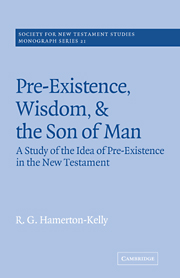1 - Pre-existence in Early Judaism
Published online by Cambridge University Press: 18 December 2009
Summary
The idea that certain things pre-exist in the mind of God or in heaven has a long history in the Biblical and early Jewish traditions. Knowledge of this history is essential for an understanding of the idea of pre-existence in the New Testament. Our first task, therefore, is to summarize the relevant material in these traditions. We have set out elsewhere the discussion on which this summary is based.
In the pre-exilic religion of Israel the theology of ‘promise and fulfilment’ entailed the idea that the things promised preexisted in God's mind. While the incident of Abraham's bargaining with God for Sodom and Gomorrah in Gen. 18: 17–33 shows that the details of God's purpose are contingent on man's response, the ultimate goal of that purpose, to judge the cities, remains unalterable. In the Balaam oracles the prophet Balaam is said to have seen the future Israel (Num. 24: 16–17). He cannot curse Israel, because God has blessed him (Num. 23: 8, 18) and already Israel exists in God's mind in that state of blessedness. Balaam saw this blessed Israel of the future in God's mind. The status of this object of Balaam's vision is very elusive; but the suggestion that Israel pre-exists in God's mind is present. In any case, a pattern of thinking is evident which is the basis for the later development of this idea.
In Deuteronomy the ‘name’ of God is the agency through which God is present in the temple (Deut. 12: 21, 14: 24).
- Type
- Chapter
- Information
- Pre-Existence, Wisdom, and The Son of ManA Study of the Idea of Pre-Existence in the New Testament, pp. 15 - 21Publisher: Cambridge University PressPrint publication year: 1973

